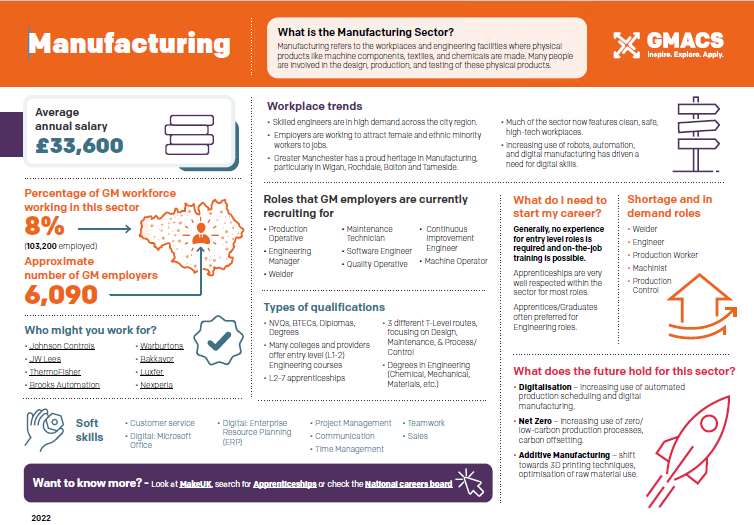If you have strong technical skills, an analytical mindset and natural problem-solving ability, a career in manufacturing and engineering could be for you.
Engineering and manufacturing is one of the UK’s broadest sectors. 5.5 million people work in engineering in the UK, accounting for 18% of all UK employment. Here in Stockport, we’re home to a range of innovative engineering and manufacturing employers supporting local and global supply chains. They’re looking to invest in talented, skilled recruits who are passionate and committed to innovating for the future.
Featured Stockport Employers
Ascia, Field Engineer
Hear from Ascia, a Field Engineer at BT Openreach, sharing her career story about working in the Engineering Industry. Joining us live from her van out on the road, her job involves fitting fibre options across Stockport, Manchester and the North West, as well as repairing faulty installations, identifying and solving related problems.
Ascia studied Engineering at College, before starting in Avionics at University and then completing an Apprenticeship with Openreach. Find out what skills are involved to succeed in her role and why she loves working as a Field Engineer.
Labour Market Information
If we believed everything we watched on TV or in movies, you’d think that nobody in the UK actually works in manufacturing anymore. Apparently, the entire industry is run by robots with astonishing efficiency!
Well, actually that’s not true. With an annual output of £192 billion, the UK remains the 9th largest manufacturing nation in the world. According to Make UK, manufacturing makes up 11% of gross value added, directly employs more than 2.6 million people, accounts for 45% of total UK exports, represents 69% of business research and development, and provides 13% of business investment.
We’re a world leader in aviation, second in the world in defence and still have a large automotive industry. We’re also a big investor in British construction, nuclear, steel and plastics – and let’s not forget chemical and pharmaceutical! While some engineering-related industries, such as mining and quarrying, are in decline, others are actively booming.
So, we do still make a lot in Britain, and Stockport is no exception. From food production companies like Allied Bakeries in Bredbury, to world-leading military bridges from WFEL in Heaton Mersey, to global semi-conductor manufacturer Nexperia in Hazel Grove – there’s plenty of ground-breaking design and engineering happening right here on our doorstep, making a career in this fast-paced sector a great choice.
Plus, it’s no secret that the manufacturing and engineering sectors are experiencing major skills shortages. This is down to a number of factors – from an ageing workforce, economic issues like Brexit, and a lack of awareness amongst young people about the careers available in the sector.
Starting Salary
£12–14.00 per hour or £18,000
per annum
Typical Salary Range
£18,500 – £112,500+
per annum
Working Hours
37 to 39 hours per week, between 8am and 6pm

LMI Infographic from GMACS
GMACS have produced a range of helpful infographics to summarise careers in the Manufacturing sector and the current employment landscape in Greater Manchester. According to the stats, the most in-demand roles are as a Machine Operator, Production Operative, Welder and Engineering Manager and you may find yourself working for one of 6,090 manufacturing employers such as Johnson Controls, ThermoFisher, Warburtons or Stockport’s own Nexperia for example. You’ll be joining 8% of GM residents who work in this sector earning an average of £33,600 and you’ll need to demonstrate project management, teamwork and digital skills (such as enterprise resource planning or ERP).
You can view the full infographic and click on the links for more information by selecting the button below to view as a PDF.
You can view the full infographic and click on the links for more information by selecting the button below to view as a PDF.























